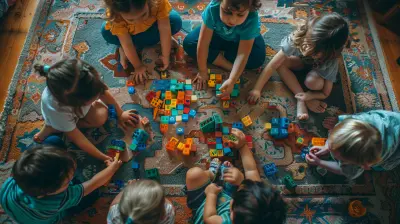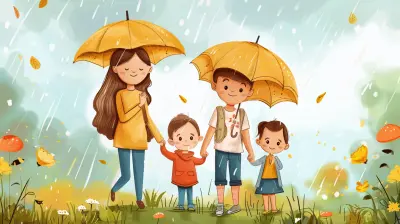22 December 2024
We’ve all heard it before: "There’s no ‘I’ in team." But let’s be real; we know it’s much more than just a cheesy slogan. Team sports aren’t just about winning trophies or scoring points—it’s about building character, forging social bonds, and creating future leaders. For kids, especially in their developmental years, team sports offer an array of benefits that extend beyond the playing field. But why exactly do team sports matter so much for kids? Grab your coffee, because we’re about to dive deep. ?
The Power of Being Part of Something Bigger
1. Developing Social Skills on and off the Field
At some point, you’ve probably noticed that when kids are around their peers, they act and communicate differently than when they’re with adults. And that makes sense—social dynamics change drastically when little ones are interacting with other kids. In team sports, these social interactions are taken to the next level.When kids join a team, they're not just learning how to catch or dribble a ball; they’re learning how to collaborate, share ideas, and resolve conflicts. Take soccer, for example. It's not just about kicking the ball into the goal. It’s about passing to a teammate, trusting that person to do his or her part, and celebrating wins together. The bonds formed on the field often lead to friendships off the field. In other words, what happens in the game doesn’t stay in the game—it spills over into real life.
Why This Matters: These interactions teach children key social skills like empathy, compromise, and the importance of communication—skills they'll need to navigate the world long after their sports days are over.
2. Building Confidence and Self-Esteem
Let’s face it, middle school can be rough. Whether it’s dealing with bullies or just trying to fit in, confidence is often in short supply during these formative years. But here’s where team sports can be a game-changer—literally.When kids are part of a team, they learn to trust their abilities and take pride in their accomplishments. Scoring a goal, blocking a shot, or even just improving from one practice to the next helps kids realize their potential. Even when things don’t go as planned—like missing a crucial shot—the supportive environment of a team helps children deal with failure constructively. With every win and loss, they learn resilience and bounce back stronger.
Why This Matters: Confidence built on the field carries over into academic life, social situations, and future challenges—setting kids up for success.
The Physical and Mental Perks of Playing Team Sports
3. Physical Fitness: More Than Just Burning Calories
Let’s admit it—getting kids off screens and moving these days can feel like pulling teeth. But give them a ball, some teammates, and a little competition, and suddenly, they’re running like the wind.Team sports promote regular physical activity, which is super important, especially with the rise of childhood obesity. Whether it's running laps in soccer, swimming laps in a pool, or sprinting down the basketball court, kids are getting a workout without even realizing it. It’s a fantastic way to sneak in the exercise they need while they’re having fun.
And here’s the thing: These physical habits often carry on into adulthood. Kids who enjoy being active in their formative years are more likely to stay active as adults.
Why This Matters: Active kids are healthier kids. Regular exercise contributes to better physical health, lower levels of stress, improved sleep, and even better concentration in school.
4. Mental Health Boost: Less Stress, More Happiness
It’s important to realize that the benefits of team sports aren't just physical—they're mental, too. We tend to think of mental health issues as something that only affects adults, but the truth is, kids experience stress, anxiety, and even depression. And guess what? Sports can help.Participating in team sports has been shown to reduce symptoms of anxiety and depression while boosting overall happiness. Why? Exercise releases endorphins—the "happy chemicals." Plus, being on a team creates a built-in support system. These kids aren’t going at it alone; they have a crew who has their back, both on and off the field. When they face tough times, they have a group to lean on for support.
Why This Matters: The mental health benefits of team sports can help kids lead happier, more balanced lives. Plus, knowing how to handle stress early in life gives them tools for coping with life’s challenges down the road.
Life Lessons Learned Through Team Sports
5. Learning the Value of Hard Work and Discipline
Anyone who’s been on a sports team knows this: Success doesn’t come overnight. Hours of practice, dedication, and, yes, sometimes failing over and over again, all contribute to eventual success. To hit that home run or sink that three-pointer, kids need to put in the work.Playing on a team instills discipline—the kind you don’t necessarily get from a classroom setting. There are practices, drills, conditioning, and game strategies to memorize. There’s a coach to listen to, a set of team rules to follow, and uniforms to maintain. It requires structure and self-control, helping kids understand that effort and commitment lead to results.
Why This Matters: These lessons in hard work don’t just stay on the field or court. Kids who learn the value of hard work in sports are more likely to apply the same principles to other areas of their lives, from academics to career goals.
6. Teamwork Teaches Accountability and Leadership
In sports, there’s no place to hide when things go wrong. If the ball’s in your hands and you mess up, well, that’s on you. But that’s a good thing! It helps kids learn accountability. When they make a mistake, they acknowledge it—own it—and work toward fixing it.On the flip side, when things go right, team sports also give kids a chance to step up and be leaders. Whether it’s motivating a teammate or offering encouragement after a tough game, team sports are a great place for kids to flex those leadership muscles.
Why This Matters: Accountability and leadership are crucial skills in the adult world. Team sports provide the perfect practice field, both literally and metaphorically, for kids to learn how to own their mistakes and embrace leadership opportunities.
7. Handling Wins and Losses with Grace
Winning is exhilarating, but losing? Not so much. Yet, knowing how to handle both outcomes with grace is one of the most important life lessons team sports can teach kids.On the one hand, winning teaches kids to celebrate their hard work and effort. After all, practice pays off. On the other hand, losing teaches humility. Not every game will be a victory, and that’s okay. Team sports help kids understand that failure is not the end; instead, it's a stepping stone to improvement.
Why This Matters: Whether in a boardroom, a classroom, or a relationship, knowing how to handle success and failure with dignity is a priceless skill.
The Ripple Effect: How Team Sports Shape Future Adults
8. Preparing For Real-World Challenges
Think about it: When was the last time you had to tackle something tough on your own? The truth is, life is full of "team" moments. Whether it’s collaborating with coworkers on a project, managing family responsibilities, or making important life decisions, team dynamics are everywhere.Participating in sports as a child helps prepare kids for these future “real-world teams.” The communication skills, the ability to empathize, the discipline, and the leadership they pick up on the field are directly transferable to their adult lives.
Why This Matters: Team sports aren’t just about the present; they’re shaping the future. Kids who play sports grow up into adults who can navigate complex social situations, work well with others, and face life's challenges head-on.
Conclusion: Raising Team Players for Life
It's easy to think of sports as just a fun after-school activity, but it's so much more than that. Team sports provide kids with essential life skills like cooperation, leadership, and resilience. They help kids stay physically fit, boost their mental health, and prepare them for challenges both on and off the field.So the next time you’re wondering if signing your child up for a team sport is worth it, the answer is a resounding "YES!" Whether they grow up to be the next LeBron James or just someone who excels at teamwork, the benefits of team sports will stick with them for a lifetime.









Grey Barrett
Engaging in team sports fosters essential life skills in children, such as cooperation, communication, and resilience. These experiences not only build camaraderie but also enhance their overall social and emotional development.
March 7, 2025 at 4:28 PM